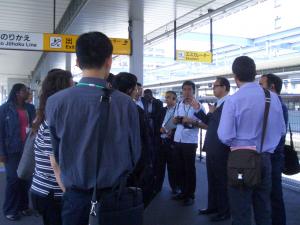 Date: 21-25 May 2012
Date: 21-25 May 2012
Place: Nagoya, Japan
The International Training Course in Regional Development (ITC) is designed and conducted to build the capacity of government officials for regional development planning and management. As a lead-up to the United Nations Conference on Sustainable Development (UNCSD/Rio+20), the forthcoming thirty-ninth ITC examined the regional development approach to a green economy to tackle poverty alleviation and promote sustainable development by building a green economy not only in the urban, but also rural and regional context. The programme comprised essential elements for building a low-carbon society, including greening the urban and rural economy, environmentally sustainable transport (EST), sustainable production and consumption (SP&C) and 3R, natural resource management, sustainable use of biodiversity, disaster management, and local resource assessment and utilization for sustainable livelihood.
Rationale and Objectives
The main objective of the course was to provide participants with prerequisite knowledge and skills in formulating and implementing an integrated set of regional development policies and measures required to build a green economy in the context of sustainable regional development. Specifically, the training course had the following objectives:
- to increase the capacity of regional development planning and management with a focus on building a green economy in developing countries;
- to enhance each participant's understanding about a green economy to identify applicable policy and initiative options for promoting a green economy in his/her country's context;
- to deepen each participant's understanding of the importance of community awareness-raising for building a low-carbon society and skills and know-how of community participation in project planning and implementation;
- to expose participants to actual situations and experiences of local governments and communities in Japan through field studies in the both urban and rural areas; and
- to provide a venue for sharing and learning from each participant's country experiences of common challenges associated with poverty reduction and sustainable development.
Programme
The five-day course delivered the expected outputs through a compact programme replete with lectures, cases for study and discussion, as well as field study visits to provide insights into Japan's regional development experience. The course revolved around the following interrelated and complimentary modules:
Module 1: Sustainable Development
Module 2: Integrated Regional Development Planning and Management
- Aichi Prefectural Government
>Module 3: Regional Development Approach to a Green Economy
- Endogenous Regional Development (Socioeconomic Development)
Module 4: Wrap-up Session
After the training course, participants formulated and submitted a draft of their city/regional/national development plan or a result report.

